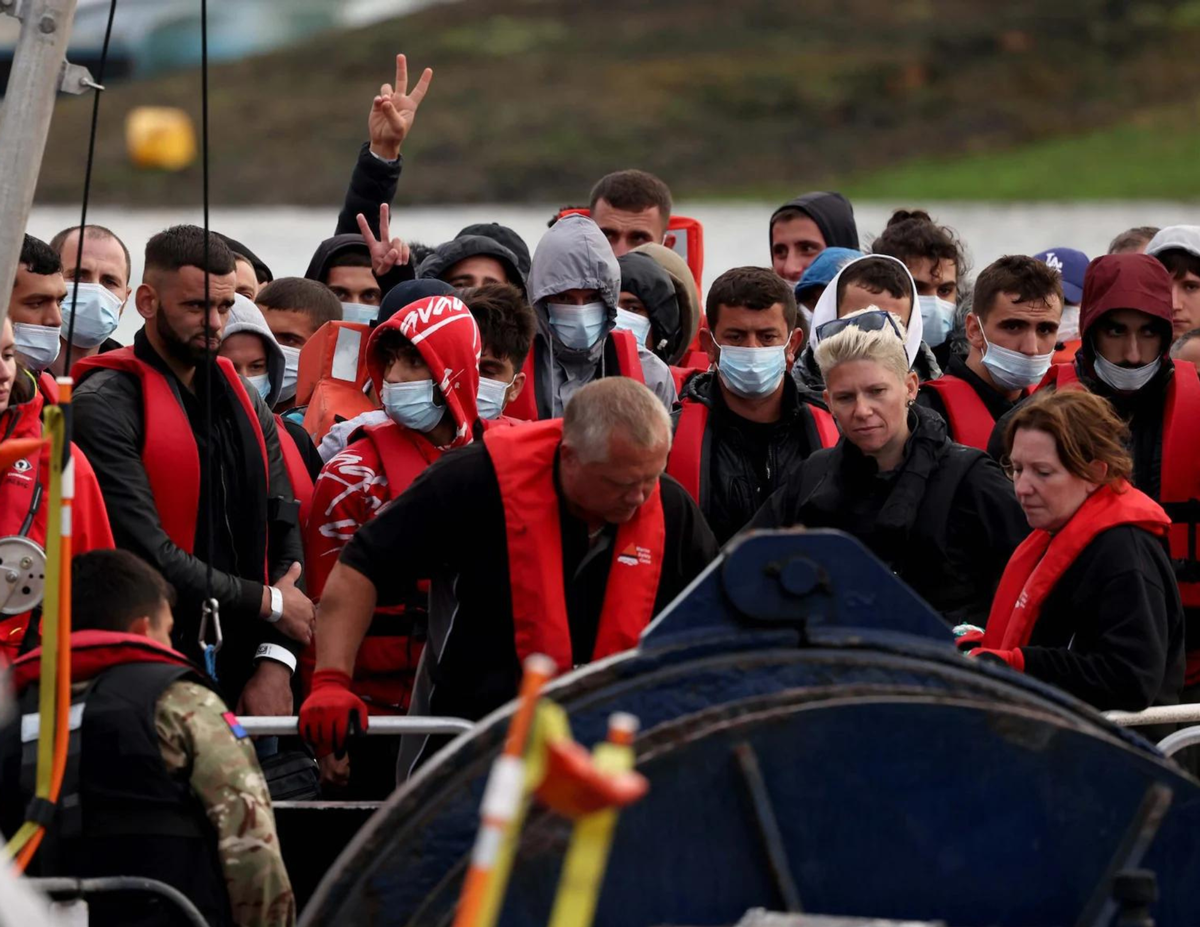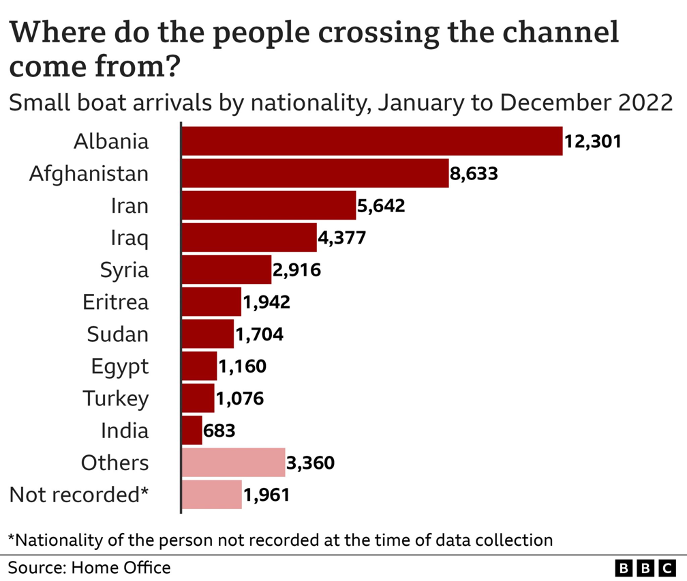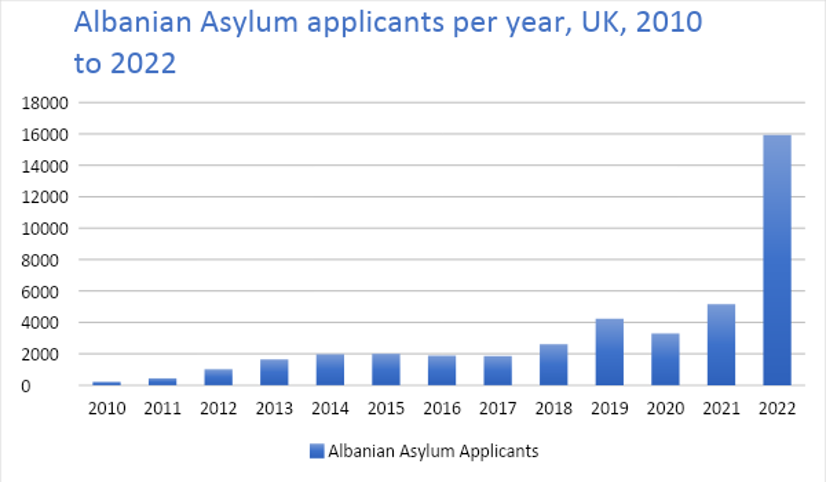Navigating the UK's asylum landscape amidst the surge of Albanian migration

Table of Contents
- Introduction
- Surge in Albanian Asylum Seekers: Trends, Concerns, and Motivations
- Challenges Faced by Albanian Asylum Seekers in the UK: Exploitation, Trauma, and Hostility
- The Illegal migration Act
- Human Rights Concerns
- Conclusion
Introduction
Albania has a long history of emigration, with a significant portion of its population residing outside its borders. The impact of immigration is deeply embedded in Albanian society, touching nearly every family in some way. While the communist dictatorship briefly stemmed this trend, emigration resurged in the 1990s and has since become a defining feature of Albanian life.
During the tumultuous 1990s, hundreds of thousands of Albanians embarked on perilous journeys across the sea, often in small boats, seeking refuge on the Italian coast. This period marked the emergence of Albanians as "boat people." Fast forward to 2022, and a new chapter unfolded, this time across the English Channel, as Albanians became the predominant nationality making the perilous journey from Calais to the shores of England with small boats.
However, while in the 1990s they fled from the grip of the communist dictatorship, the horrors of civil war, and the Kosovo war, the question now is: What drives Albanians to leave their homeland today? In this article, we delve into the mass migration of Albanians to the UK in 2022, exploring the reasons for their migration while also examining the response of the British government to this phenomenon.
Surge in Albanian Asylum Seekers: Trends, Concerns, and Motivations
According to the Home Office, there has been a notable surge in the influx of Albanians entering the UK illegally via small boats, with Albanians constituting the predominant nationality among small boat arrivals, accounting for 27% of such instances.

Figure n° 1: Statistics of the nationality of, people crossing the channel in 2022, source: BBC News
The majority of Albanians arriving via small boats subsequently seek asylum upon entering the UK, with a striking 85% (10,699 individuals) submitting asylum applications. Notably, prior to recent years, the UK had not experienced such a significant volume of asylum applications from Albanians. Over the past decade, there has been a marked increase in asylum applications from Albanians, with the disparity between 2010 and 2022 being particularly stark rising. It is interesting to observe how drastic the gap is between the number of asylum seekers in 2021 (5147 applications) and that in 2022 (15925 applications).

Figure n° 2: Number of Albanian Applicants per year in the UK, source: Home Office
In 2022 alone, around 16,000 Albanians applied for asylum, constituting 16% of the total applicants, as reported by the Migration Observatory. This data has prompted considerable concern among the public and within the Home Office, which, in its 2023 report, characterised this trend as an “emergence.” The question arises: why are Albanians seeking asylum? While Albania is characterised by high poverty, unemployment, and corruption rates, these economic factors alone do not meet the criteria for asylum. Moreover, Albania is not currently engaged in armed conflict.
As per the Country and Policy Information Notes (CPINs) issued by the Home Office concerning Albania, asylum seekers commonly cite four primary reasons for seeking refuge. These encompass human trafficking and modern slavery, blood feuds, challenges related to sexual orientation, gender identity, and expression, as well as instances of domestic violence against women.
Challenges Faced by Albanian Asylum Seekers in the UK: Exploitation, Trauma, and Hostility
The influx of Albanians arriving in the UK predominantly comprises young individuals, including many minors and young women with small children. Tragically, a significant portion of these individuals are victims of various forms of exploitation and violence in their homeland, ranging from trafficking and organised crime to blood feuds, forced marriages, and honour-based violence. The harrowing experiences they endured in Albania, coupled with the perilous journey to reach safety and the challenges of adapting to a new country with unfamiliar customs and language, have taken a profound toll on their mental well-being. As a result, many are struggling with severe trauma and depression. Unfortunately, despite their vulnerabilities and the complexities of their circumstances, the Home Office in the UK has faced persistent criticism and accusations of hostility toward asylum seekers and refugees. Alarmingly, it appears that Albanians have become a focal point of this scrutiny, with the community increasingly subjected to public debate characterised by media portrayals that dehumanise them and cast doubt on their experiences, accusing them of lying.
“Saying that Albanian asylum seekers are lying is just based on subjective opinions and not facts. Just because it is not at war like Afghanistan or Iraq does not mean that it is a safe place”
(Anonymous testimony of a young Albanian Seeker).

Picture n°1: Albanians landing in the UK, source: Albanian Daily News
Since 2021, there has been a concerning surge in xenophobic rhetoric targeting Albanians in the UK, with various media outlets, including the Daily Mail, propagating narratives that depict them as criminals, invaders, and fraudulent asylum seekers. This harmful portrayal has fuelled negative stereotypes and fostered a climate of distrust and hostility toward the Albanian community.

Picture n° 2: National and International Media headings in UK regarding Albanian illegal immigration in 2022
The narrative surrounding Albanian asylum seekers in the UK has taken a disturbing turn, with figures such as Nigel Farage of GB News labelling their arrival as an "invasion" and associating them with criminal groups, further stigmatising an already vulnerable population. Similarly, Home Secretary Suella Braverman's assertion that there is no legitimate reason for Albanians to seek asylum in the UK, coupled with her characterization of them as "criminals," has incited outrage within the Albanian community.
The Home Office's heightened scrutiny of asylum claims from Albanians, viewing them through the lens of suspicion and criminality, exacerbates the challenges faced by individuals already grappling with trauma and uncertainty. The government's suggestion that modern slavery laws are being "abused" to delay deportation only adds to the distress, with proposed revisions to legislation potentially compounding the plight of vulnerable individuals.
The Illegal migration Act
The increase in arrivals by sea has not only sparked heated debates within British society but has also pushed politicians to re-evaluate and reform existing legislation, leading to significant changes in the country's approach to managing irregular immigration. Since the summer of 2022, the Conservative Party-led government has been resolute in its efforts to enact legislation to mitigate the significant influx of migrants arriving on English shores illegally. As a result, one of the key objectives of government policy, under the leadership of Prime Minister Rishi Sunak, has been to stop these arrivals. Prime Minister Sunak led the “stop the boats” campaign, with the overall aim of reducing illegal immigration and ensuring fairness for the British population.
Data analysis revealed that despite the implementation of the Nationality and Borders Law of 27 April 2022, aimed at reducing arrivals, its effectiveness has been questioned. However, there was a notable increase in arrivals, which reached unprecedented levels. Hence, in March 2023, a new bill was proposed, ultimately ratified on July 20, 2023: The Illegal Migration Act.
The primary aim of the Illegal Migration Act is to deter unlawful migration by mandating the Home Secretary to deport those who enter the UK irregularly, regardless of their mode of arrival, to their home country or a designated safe third nation. However, the Act's provisions also pose severe repercussions for victims of trafficking and modern slavery who enter irregularly, potentially depriving them of vital support and subjecting them to immediate detention without opportunity for assessment or appeal. This raises significant concerns about the infringement upon the rights and welfare of vulnerable individuals.
Being Albanians the primary nationality arriving in the UK illegally by small boats, they are directly affected by the Act's provisions mandating deportation for irregular arrivals. Additionally, the Act designates Albania as a "safe country," implying that asylum claims from Albanians may face heightened scrutiny or denial, further affecting their ability to seek refuge in the UK. This legislation effectively singles out Albanians as a key demographic subject to its regulations, shaping their experiences and opportunities within the UK immigration system.
Human Rights Concerns
The Illegal Migration Act introduces highly stringent measures, some of which are unprecedented, with significant implications for human rights.
One of the most evident breaches in international law is the breach of the Refugee Convention, specifically the principles outlined in article 31(1) which outlines that refugees should not face penalties on their method of entry.
The new legislation denies refugee protection to individuals arriving in the UK through irregular means, such as crossing the English Channel in small boats. These asylum-seekers face detention and deportation without individual assessment of their circumstances. Clauses 11-15 of the Act expand the detention system, allowing indefinite detention and removing judicial oversight. Detainees are denied access to immigration bail or judicial review within the initial 28 days, impacting mental health and breaching international obligations regarding detention rights. The UK's use of indefinite detention is criticized as a form of torture and violates various human rights agreements, including the European Convention on Human Rights and the Universal Declaration of Human Rights.
The Act includes clauses regarding modern slavery that limit victims' access to asylum and protections under the Modern Slavery Act 2015. This contravenes the UK's obligations under the Council of Europe Convention on Action against Trafficking in Human Beings and is deemed a clear violation of Article 4 of the European Convention on Human Rights (ECHR) by the parliamentary Joint Committee on Human Rights (JCHR). Denying asylum to recognized victims of modern slavery increases their vulnerability to exploitation and re-trafficking
Clauses 2-10 of the Act mandate the Secretary of State to arrange removals of individuals entering the UK illegally, with sections 5-6 granting broad authority to deport asylum seekers. However, this overlooks specific dangers faced by vulnerable groups like trafficked women or those persecuted due to sexual orientation or gender identity. Stigmatisation of Albanian migrants by the British government perpetuates this misunderstanding. The Act's prioritisation of generalised risk assessments may expose claimants to increased danger, risking violations of non-refoulement principles and breaching international conventions, including the Refugee Convention and Article 3 of the ECHR.
The British government promotes safe and legal routes under the Illegal Migration Act, but Amnesty International highlights limitations. Asylum claims can't be made outside the UK due to immigration regulations, and there are no visa options explicitly for seeking asylum upon arrival. Nationality-specific immigration routes exist for some countries, but others lack equivalent systems, raising concerns about equitable access to asylum. The Refugee Convention affirms the right to seek asylum for all, regardless of nationality.
Conclusion
The recent increase in Albanian migration to the UK, particularly through small boats, highlights the complex challenges in today's immigration landscape.
Since September 2022, British media have consistently focused on Albanians, often portraying them negatively with discriminatory and xenophobic terms. This portrayal has unfairly blamed Albanians for perceived problems in the UK's immigration policies.
By labelling Albania as a "safe country" and imposing strict measures on irregular arrivals, the Illegal Migration Act not only targets Albanians but also violates international human rights standards that are affecting refugees and asylum seekers of all nationalities.
In light of these concerns, it is imperative for the British government to reassess its asylum and immigration policies, ensuring they align with international human rights standards and provide adequate protection for vulnerable individuals. Such measures should prioritise fairness, dignity, and respect for human rights, reflecting the UK's commitment to upholding its obligations under international law.

